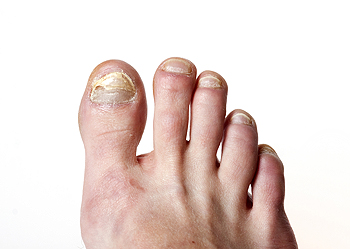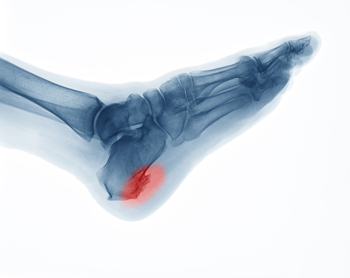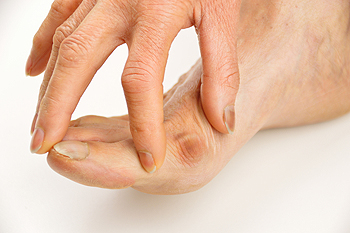Connect With Us
Blog
Reasons Why Toenail Fungus May Develop
 A foot condition known as toenail fungus is quite common among patients who are over sixty years old. It can happen because of an autoimmune disorder, nail trauma, or if the patient has athlete’s foot. Toenail fungus is contagious and is caused by a fungus that enters the skin through tiny cracks. This type of fungus lives and thrives in warm and moist environments. These can consist of public swimming pools, shower room floors, and surrounding areas. A common symptom that is associated with toenail fungus includes a yellowing and thickening of the nails, which will often begin with the big toe. In severe cases, the nails may become brittle and may gradually crack and fall off. Mild relief may be found when the toenails are kept short, and it may help to wear shoes and socks that are made of breathable materials. Additionally, it is recommended that if you are afflicted with toenail fungus you should refrain from sharing towels, shoes, and socks. Please consult with a podiatrist if you would like more information about how to treat toenail fungus.
A foot condition known as toenail fungus is quite common among patients who are over sixty years old. It can happen because of an autoimmune disorder, nail trauma, or if the patient has athlete’s foot. Toenail fungus is contagious and is caused by a fungus that enters the skin through tiny cracks. This type of fungus lives and thrives in warm and moist environments. These can consist of public swimming pools, shower room floors, and surrounding areas. A common symptom that is associated with toenail fungus includes a yellowing and thickening of the nails, which will often begin with the big toe. In severe cases, the nails may become brittle and may gradually crack and fall off. Mild relief may be found when the toenails are kept short, and it may help to wear shoes and socks that are made of breathable materials. Additionally, it is recommended that if you are afflicted with toenail fungus you should refrain from sharing towels, shoes, and socks. Please consult with a podiatrist if you would like more information about how to treat toenail fungus.
If left untreated, toenail fungus may spread to other toenails, skin, or even fingernails. If you suspect you have toenail fungus it is important to seek treatment right away. For more information about treatment, contact one of our podiatrists of Foot & Ankle Associates of Maine. Our doctors can provide the care you need to keep you pain-free and on your feet.
Symptoms
- Warped or oddly shaped nails
- Yellowish nails
- Loose/separated nail
- Buildup of bits and pieces of nail fragments under the nail
- Brittle, broken, thickened nail
Treatment
If self-care strategies and over-the-counter medications does not help your fungus, your podiatrist may give you a prescription drug instead. Even if you find relief from your toenail fungus symptoms, you may experience a repeat infection in the future.
Prevention
In order to prevent getting toenail fungus in the future, you should always make sure to wash your feet with soap and water. After washing, it is important to dry your feet thoroughly especially in between the toes. When trimming your toenails, be sure to trim straight across instead of in a rounded shape. It is crucial not to cover up discolored nails with nail polish because that will prevent your nail from being able to “breathe”.
In some cases, surgical procedure may be needed to remove the toenail fungus. Consult with your podiatrist about the best treatment options for your case of toenail fungus.
If you have any questions, please feel free to contact our office located in Brunswick, ME . We offer the newest diagnostic and treatment technologies for all your foot care needs.
Heel Spurs and The Plantar Fascia
 The human foot has twenty-six bones. A heel spur is defined as a bony hook that forms on the bottom of the heel. This often causes severe pain and discomfort, and it can be difficult to walk. Heel spurs form on the largest bone in the foot, known as the calcaneus. The heel spur generally develops at the spot where the plantar fascia attaches to the bone. This band of tissue is located on the sole of the foot, and connects the heel to the toes. The pain comes from surrounding tissues that become inflamed, and sharp and sudden pain may exist in the sole of the foot. Heel spurs can be diagnosed by taking an X-ray of the affected foot. If you have a heel spur, it is strongly suggested that you seek the counsel of a podiatrist who can effectively diagnose and treat heel spurs.
The human foot has twenty-six bones. A heel spur is defined as a bony hook that forms on the bottom of the heel. This often causes severe pain and discomfort, and it can be difficult to walk. Heel spurs form on the largest bone in the foot, known as the calcaneus. The heel spur generally develops at the spot where the plantar fascia attaches to the bone. This band of tissue is located on the sole of the foot, and connects the heel to the toes. The pain comes from surrounding tissues that become inflamed, and sharp and sudden pain may exist in the sole of the foot. Heel spurs can be diagnosed by taking an X-ray of the affected foot. If you have a heel spur, it is strongly suggested that you seek the counsel of a podiatrist who can effectively diagnose and treat heel spurs.
Heel spurs can be incredibly painful and sometimes may make you unable to participate in physical activities. To get medical care for your heel spurs, contact one of our podiatrists from Foot & Ankle Associates of Maine. Our doctors will do everything possible to treat your condition.
Heels Spurs
Heel spurs are formed by calcium deposits on the back of the foot where the heel is. This can also be caused by small fragments of bone breaking off one section of the foot, attaching onto the back of the foot. Heel spurs can also be bone growth on the back of the foot and may grow in the direction of the arch of the foot.
Older individuals usually suffer from heel spurs and pain sometimes intensifies with age. One of the main condition's spurs are related to is plantar fasciitis.
Pain
The pain associated with spurs is often because of weight placed on the feet. When someone is walking, their entire weight is concentrated on the feet. Bone spurs then have the tendency to affect other bones and tissues around the foot. As the pain continues, the feet will become tender and sensitive over time.
Treatments
There are many ways to treat heel spurs. If one is suffering from heel spurs in conjunction with pain, there are several methods for healing. Medication, surgery, and herbal care are some options.
If you have any questions feel free to contact our office located in Brunswick, ME . We offer the latest in diagnostic and treatment technology to meet your needs.
Yoga May Help to Prevent Bunion Pain
 A common foot condition that develops in the front of the foot is known as a bunion. It appears as a large bump on the side of the big toe, and it can be uncomfortable while wearing shoes. Additionally, large bunions can push the second toe into the toe next to it, and this can be a result of changing foot structure. Bunions can develop due to genetics, or from wearing shoes that do not have adequate room for the toes to move freely in. An effective yoga pose that can keep the foot strong is known as downward dog. This is done by keeping the hands and feet flat on the floor while extending the lower torso into the air. Additionally, the toes can be strengthened by performing a seated forward bend. If you would like more information about what stretches and yoga poses can benefit bunions, please consult with a podiatrist.
A common foot condition that develops in the front of the foot is known as a bunion. It appears as a large bump on the side of the big toe, and it can be uncomfortable while wearing shoes. Additionally, large bunions can push the second toe into the toe next to it, and this can be a result of changing foot structure. Bunions can develop due to genetics, or from wearing shoes that do not have adequate room for the toes to move freely in. An effective yoga pose that can keep the foot strong is known as downward dog. This is done by keeping the hands and feet flat on the floor while extending the lower torso into the air. Additionally, the toes can be strengthened by performing a seated forward bend. If you would like more information about what stretches and yoga poses can benefit bunions, please consult with a podiatrist.
If you are suffering from bunion pain, contact one of our podiatrists of Foot & Ankle Associates of Maine. Our doctors can provide the care you need to keep you pain-free and on your feet.
What Is a Bunion?
Bunions are painful bony bumps that usually develop on the inside of the foot at the joint of the big toe. As the deformity increases over time, it may become painful to walk and wear shoes. Women are more likely to exacerbate existing bunions since they often wear tight, narrow shoes that shift their toes together. Bunion pain can be relieved by wearing wider shoes with enough room for the toes.
Causes
- Genetics – some people inherit feet that are more prone to bunion development
- Inflammatory Conditions - rheumatoid arthritis and polio may cause bunion development
Symptoms
- Redness and inflammation
- Pain and tenderness
- Callus or corns on the bump
- Restricted motion in the big toe
In order to diagnose your bunion, your podiatrist may ask about your medical history, symptoms, and general health. Your doctor might also order an x-ray to take a closer look at your feet. Nonsurgical treatment options include orthotics, padding, icing, changes in footwear, and medication. If nonsurgical treatments don’t alleviate your bunion pain, surgery may be necessary.
If you have any questions, please feel free to contact our office located in Brunswick, ME . We offer the newest diagnostic and treatment technologies for all your foot care needs.

